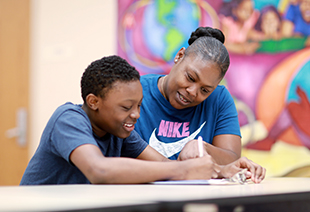CF WELL Program Creates Innovative Family Care Model for Cystic Fibrosis

Based on learnings from its first five years, the cystic fibrosis (CF) experts of Cincinnati Children’s CF WELL (Wellness Education Learning Laboratory) program are taking an innovative approach to serving its 250 families whose children have cystic fibrosis. The program uses quality improvement and research methodology to look beyond a patient care model and better integrate wellness into a family care model.
“At the fundamental level, we need to identify family needs better than in the past, identify interventions to respond to those needs, and implement interventions and test them to see if they are working,” says Thomas Boat, MD, director of the program. Boat and his team sat down with parents and identified what mattered most to them. Families raised issues such as stress management, sleep, nutrition and exercise, and how to advocate effectively to help their children perform well in school.

Efforts in the past year to help elevate the quality of family life included:
Sleep research. CF researchers at Cincinnati Children’s continue to explore implications of their own findings that many CF children and parents experience lack of sufficient sleep. Michelle Hjelm, MD, associate director of CF WELL, pediatric pulmonologist and sleep medicine specialist, is working on a program to support sleep for families of children with CF. Up to 40% of parents surveyed said they suffered from daytime sleepiness. “We’re studying sleep disruptions and where sleep goes wrong,” Hjelm says.
Stress management. Building on a paper Boat and others worked on regarding mindfulness training, the team is exploring mind-body techniques and breathing exercises to reduce stress in families. Some of these techniques have been used with patient-reported benefit during lung function testing, which is a regular part of care for people with CF.
Assistance with school performance. A major stressor for parents is not knowing how to help their child perform well in school. CF WELL has been instrumental in hiring a school intervention specialist to act as a bridge between families and schools unfamiliar with the needs of a child who has CF. Funded previously by the Boomer Esiason Foundation and currently by the Cystic Fibrosis Foundation, the intervention specialist helps eliminate barriers to school attendance and often meets with principals, school nurses and classmates. She has more than 500 encounters with schools each year.
Boat recognizes the burden a chronic condition places on a family. “We’ve been very successful at extending life expectancy of people with CF, and we want to support parents and families so they are more resilient and have joy as a family,” he says.

